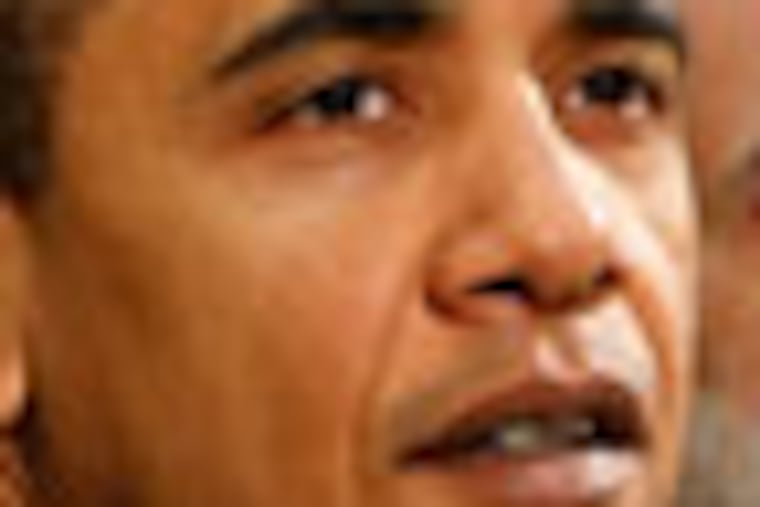The American Debate: Obama's first 100 days
On the cusp of his first 100 days in office, the new president is fully embarked on his transformative mission, dominating the news cycle by sheer force of his telegenic cool, exuding confidence, and prompting downhearted Americans to feel better about their troubled country.

On the cusp of his first 100 days in office, the new president is fully embarked on his transformative mission, dominating the news cycle by sheer force of his telegenic cool, exuding confidence, and prompting downhearted Americans to feel better about their troubled country.
The New York Times praises his "remarkable political strengths and gifts," particularly his "gift for political theatre." Meanwhile, his popularity is driving his critics batty; they find him to be a frustratingly elusive target. One alarmed alumnus of a previous administration complains that he "has proposed a huge restructuring of government, and people are actually taking him seriously. The man . . . turns out to be downright radical."
Such were the initial reactions, in the spring of 1981, to Ronald Reagan.
But the same description also can be applied to Barack Obama, now on the cusp of his own 100 days.
Of course, all historical analogies are marred by inexactitude. But they can give us perspective on the passions of the moment. Too often, in our hyperbolic 24/7 political culture, every presidential uptick is interpreted as a symptom of eternal greatness, while every downtick is thought to be a harbinger of total disaster. We often tend to overlook the natural ebb and flow of a presidential tenure over time; in other words, it's not always possible to judge a new leader by dint of his first 100 days - an artificial measure introduced at the dawn of FDR.
Reagan was highly visible from the outset - a staff memo had advised that he govern as if running "a perennial campaign" - but he basically focused on just a few big issues, carefully laying the groundwork for massive tax cuts. He didn't even sign his first law until early April, from his hospital bed. He certainly didn't bust out of the gate this way:
Signing an economic-stimulus plan; signing a law expanding health insurance for children and another providing more pay equity for women; shifting the priorities in two foreign wars; demanding historic reforms in energy, education, and health care; bailing out banks; expanding stem-cell research; killing sacred cows in the defense budget; talking nice to Muslims; taking on greenhouse gases; touting the benefits of high-speed trains; doing outreach to Cuba; firing a top car-company executive; killing pirates; getting a dog; and whatever else I lack the space to cite.
Obama's early peripatetic pace is no more a guarantee of eventual greatness than Reagan's more measured pace was a portent of ultimate failure. Yet there are striking similarities between the two men, in terms of their governing styles. Reagan hit many bumps in the road (scandals, economic downturns), but he retired with his popularity basically intact; that's one key mark of a successful president. Obama has the potential to do the same.
Obama, like Reagan, is a gifted communicator who believes in his power to persuade the public and thus frame the political discourse. Obama, like Reagan, is self-confident enough to shrug off criticism, real or anticipated. (Witness his willingness to host the Grateful Dead in the Oval Office on April 13, with nary a care about whether conservative critics would play the permissive-'60s card.)
Likability can be dismissed as a superficial factor, but it's crucial to any contemporary president's success. A personally popular president is typically cushioned during tough times, as Reagan discovered during the Iran-Contra scandal and during the tough times early in his tenure when economic indicators were bleak.
When Reagan embarked upon his first 100 days in 1981, the jobless rate was 7.5 percent; on the eve of the 1982 congressional elections, it was 10.8 percent. Reagan initially had predicted a 4 percent gross domestic product increase in 1982; that year, GDP fell nearly 2 percent. Yet he suffered only modest losses in the Democratic House, he lost zero seats in the Republican Senate (clearly, people were willing to be patient), and the '83 economic recovery set up his landslide reelection victory.
Obama's likability could aid him as well. At the 100-day mark (which arrives Wednesday), Obama is more popular than his policies; for instance, most Americans like him a lot, but they dislike his bank bailouts. Republican critics insist that this disconnect ultimately will bring him down, but they're forgetting their history.
Back in the '80s, Reagan's persona was always more popular than his agenda. Shortly after he marked his first 100 days, the Gallup Poll said: "While the public generally admires Reagan for his personal attributes . . . many people are either dubious or downright skeptical about the effectiveness of the president's approaches to [the nation's economic] problems."
The Democrats spent much of the decade citing such reports. I'd lunch with Democratic strategists who always insisted that "the people are with us on the issues," on everything from the environment to Social Security to health care. They were right about those issues, but it got them nowhere. Reagan's personal gifts trumped the issues.
In the spring of '81, the Times wrote that "his first 100 days have shown that he is a president determined to change the tides of history. The question remains whether his popularity and his claim of a mandate have given him enough strength to do it." Reagan did it. He inherited an economic mess that lingered for several years, but his personal bond with the people proved strong enough to pull him through.
Obama, plagued by severe economic ills, but possessed of similar presidential traits, could ultimately weather his storm in similar fashion.